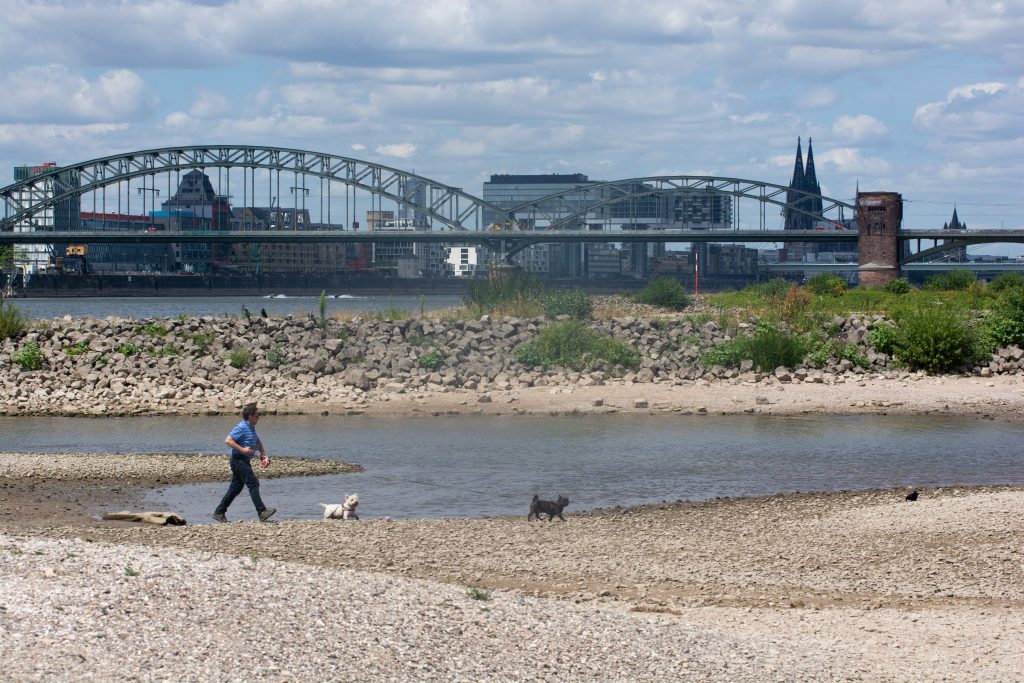- The River Rhine is drying up amid record-breaking summer heatwaves.
- The river, which passes through Germany, Switzerland, and the Netherlands, is crucial for moving cargo.
- The water level at the Rhine's bottleneck is at its lowest level in at least 15 years, Bloomberg reported.
The River Rhine, one of Europe's most important rivers which is used to transport cargo including chemicals, grains, and coal across the continent, is drying up amid record-breaking summer heatwaves.
Germany's Federal Institute of Hydrology has warned that rivers in Central Europe are at "unusually low" levels and are continuing to fall.
Much of the 800-mile Rhine passes through Germany, Europe's biggest economy, but the river also runs through Austria, Switzerland, and the Netherlands as well as along the border between France and Germany.
The water level at Kaub, the river's bottleneck, was 71 centimeters (just under 28 inches) on Tuesday morning, according to Germany's federal administration for waterways and shipping. When it reached 77 centimeters (30 inches) last week, it was already at the lowest level for this time of year since at least 2007, Bloomberg reported, citing government data.
Southwest Germany news outlet SWR reported that the low level of water is limiting shipping on the Rhine south of Duisburg and Cologne and that for days, freight ships haven't been able to travel fully-loaded.
A representative for Germany's Federal Institute of Hydrology told Bloomberg that if the level at Kaub dips down to 40 centimeters (15.7 inches), it's uneconomical for vessels carrying commodities to sail past it given how little cargo they'd be able to carry.

The low water levels already impacting energy supplies. The supply of coal to two power stations in Germany – one in Mannheim and another in Karlsruhe – has been "affected" by low water levels in the Rhine since July 13, according to the EEX exchange.
A spokesperson for Shell, which owns refineries along the Rhine, told Bloomberg that the company was monitoring the situation.
This comes after Russia's invasion of Ukraine caused huge disruptions to Europe's energy market. Western nations have been moving to pivot from Russian energy sources, while Russia itself has cut off some gas supplies to countries including Germany over their refusal to pay in rubles.

In late June, Germany announced that it had entered the second of its three-stage gas emergency plan and warned that supplies were under pressure.
To plug the cap, Germany has imported more natural gas from Norway and the Netherlands, as well as more liquefied natural gas. It's also made plans to fire up idle coal power plants as a short-term fix and Hamburg has even warned that it could ration hot water.
Germany's weather service issued heat warnings for almost all the country on Tuesday. Temperatures are set to reach nearly 40 degrees Celsius (just over 100 degrees Fahrenheit) in some parts of the country, including Berlin, Leipzig, and Hannover, though the areas through which the Rhine flows are expected to be slightly cooler.
Low water levels on the Rhine having an economic impact has not been uncommon in recent years, with a lack of water in the river attributed in 2019 to causing a short-lived recession in Germany at the tail end of 2018.
Pantheon Macroeconomics said in January 2019 that low river levels effectively amount to a "supply shock in German manufacturing," by lowering the availability of key goods needed for the sector.
